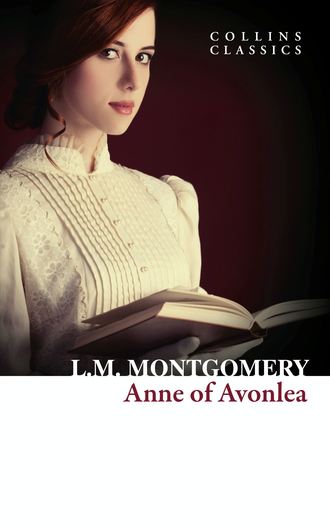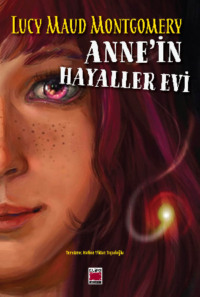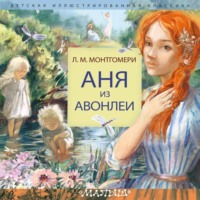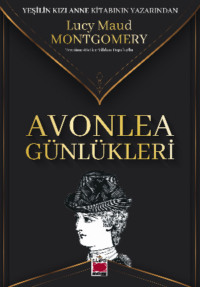
Полная версия
Anne of Avonlea
“I’ve always heard that Mrs. Theodore White was the neatest woman alive and I’ll believe it after this,” said Diana, giving way to her suppressed laughter as soon as it was safe.
“I am glad she has no children,” said Anne solemnly. “It would be dreadful beyond words for them if she had.”
At the Spencers’ Mrs. Isabella Spencer made them miserable by saying something ill-natured about everyone in Avonlea. Mr. Thomas Boulter refused to give anything because the hall, when it had been built, twenty years before, hadn’t been built on the site he recommended. Mrs. Esther Bell, who was the picture of health, took half an hour to detail all her aches and pains, and sadly put down fifty cents because she wouldn’t be there that time next year to do it … no, she would be in her grave.
Their worst reception, however, was at Simon Fletcher’s. When they drove into the yard they saw two faces peering at them through the porch window. But although they rapped and waited patiently and persistently nobody came to the door. Two decidedly ruffled and indignant girls drove away from Simon Fletcher’s. Even Anne admitted that she was beginning to feel discouraged. But the tide turned after that. Several Sloane homesteads came next, where they got liberal subscriptions, and from that to the end they fared well, with only an occasional snub. Their last place of call was at Robert Dickson’s by the pond bridge. They stayed to tea here, although they were nearly home, rather than risk offending Mrs. Dickson, who had the reputation of being a very “touchy” woman.
While they were there old Mrs. James White called in.
“I’ve just been down to Lorenzo’s,” she announced. “He’s the proudest man in Avonlea this minute. What do you think? There’s a brand new boy there … and after seven girls that’s quite an event, I can tell you.” Anne pricked up her ears, and when they drove away she said.
“I’m going straight to Lorenzo White’s.”
“But he lives on the White Sands road and it’s quite a distance out of our way,” protested Diana. “Gilbert and Fred will canvass him.”
“They are not going around until next Saturday and it will be too late by then,” said Anne firmly. “The novelty will be worn off. Lorenzo White is dreadfully mean but he will subscribe to anything just now. We mustn’t let such a golden opportunity slip, Diana.” The result justified Anne’s foresight. Mr. White met them in the yard, beaming like the sun upon an Easter day. When Anne asked for a subscription he agreed enthusiastically.
“Certain, certain. Just put me down for a dollar more than the highest subscription you’ve got.”
“That will be five dollars … Mr. Daniel Blair put down four,” said Anne, half afraid. But Lorenzo did not flinch.
“Five it is … and here’s the money on the spot. Now, I want you to come into the house. There’s something in there worth seeing … something very few people have seen as yet. Just come in and pass your opinion.”
“What will we say if the baby isn’t pretty?” whispered Diana in trepidation as they followed the excited Lorenzo into the house.
“Oh, there will certainly be something else nice to say about it,” said Anne easily. “There always is about a baby.”
The baby was pretty, however, and Mr. White felt that he got his five dollars’ worth of the girls’ honest delight over the plump little newcomer. But that was the first, last, and only time that Lorenzo White ever subscribed to anything.
Anne, tired as she was, made one more effort for the public weal that night, slipping over the fields to interview Mr. Harrison, who was as usual smoking his pipe on the veranda with Ginger beside him. Strickly speaking he was on the Carmody road; but Jane and Gertie, who were not acquainted with him save by doubtful report, had nervously begged Anne to canvass him.
Mr. Harrison, however, flatly refused to subscribe a cent, and all Anne’s wiles were in vain.
“But I thought you approved of our society, Mr. Harrison,” she mourned.
“So I do … so I do … but my approval doesn’t go as deep as my pocket, Anne.”
“A few more experiences such as I have had today would make me as much of a pessimist as Miss Eliza Andrews,” Anne told her reflection in the east gable mirror at bedtime.
CHAPTER 7
The Pointing of Duty
Anne leaned back in her chair one mild October evening and sighed. She was sitting at a table covered with text books and exercises, but the closely written sheets of paper before her had no apparent connection with studies or school work.
“What is the matter?” asked Gilbert, who had arrived at the open kitchen door just in time to hear the sigh.
Anne colored, and thrust her writing out of sight under some school compositions.
“Nothing very dreadful. I was just trying to write out some of my thoughts, as Professor Hamilton advised me, but I couldn’t get them to please me. They seem so still and foolish directly they’re written down on white paper with black ink. Fancies are like shadows … you can’t cage them, they’re such wayward, dancing things. But perhaps I’ll learn the secret some day if I keep on trying. I haven’t a great many spare moments, you know. By the time I finish correcting school exercises and compositions, I don’t always feel like writing any of my own.”
“You are getting on splendidly in school, Anne. All the children like you,” said Gilbert, sitting down on the stone step.
“No, not all. Anthony Pye doesn’t and won’t like me. What is worse, he doesn’t respect me … no, he doesn’t. He simply holds me in contempt and I don’t mind confessing to you that it worries me miserably. It isn’t that he is so very bad … he is only rather mischievous, but no worse than some of the others. He seldom disobeys me; but he obeys with a scornful air of toleration as if it wasn’t worthwhile disputing the point or he would … and it has a bad effect on the others. I’ve tried every way to win him but I’m beginning to fear I never shall. I want to, for he’s rather a cute little lad, if he is a Pye, and I could like him if he’d let me.”
“Probably it’s merely the effect of what he hears at home.”
“Not altogether. Anthony is an independent little chap and makes up his own mind about things. He has always gone to men before and he says girl teachers are no good. Well, we’ll see what patience and kindness will do. I like overcoming difficulties and teaching is really very interesting work. Paul Irving makes up for all that is lacking in the others. That child is a perfect darling, Gilbert, and a genius into the bargain. I’m persuaded the world will hear of him some day,” concluded Anne in a tone of conviction.
“I like teaching, too,” said Gilbert. “It’s good training, for one thing. Why, Anne, I’ve learned more in the weeks I’ve been teaching the young ideas of White Sands than I learned in all the years I went to school myself. We all seem to be getting on pretty well. The Newbridge people like Jane, I hear; and I think White Sands is tolerably satisfied with your humble servant … all except Mr. Andrew Spencer. I met Mrs. Peter Blewett on my way home last night and she told me she thought it her duty to inform me that Mr. Spencer didn’t approve of my methods.”
“Have you ever noticed,” asked Anne reflectively, “that when people say it is their duty to tell you a certain thing you may prepare for something disagreeable? Why is it that they never seem to think it a duty to tell you the pleasant things they hear about you? Mrs. H. B. Donnell called at the school again yesterday and told me she thought it her duty to inform me that Mrs. Harmon Andrew didn’t approve of my reading fairy tales to the children, and that Mr. Rogerson thought Prillie wasn’t coming on fast enough in arithmetic. If Prillie would spend less time making eyes at the boys over her slate she might do better. I feel quite sure that Jack Gillis works her class sums for her, though I’ve never been able to catch him red-handed.”
“Have you succeeded in reconciling Mrs. Donnell’s hopeful son to his saintly name?”
“Yes,” laughed Anne, “but it was really a difficult task. At first, when I called him ‘St. Clair’ he would not take the least notice until I’d spoken two or three times; and then, when the other boys nudged him, he would look up with such an aggrieved air, as if I’d called him John or Charlie and he couldn’t be expected to know I meant him. So I kept him in after school one night and talked kindly to him. I told him his mother wished me to call him St. Clair and I couldn’t go against her wishes. He saw it when it was all explained out … he’s really a very reasonable little fellow … and he said I could call him St. Clair but that he’d ‘lick the stuffing’ out of any of the boys that tried it. Of course, I had to rebuke him again for using such shocking language. Since then I call him St. Clair and the boys call him Jake and all goes smoothly. He informs me that he means to be a carpenter, but Mrs. Donnell says I am to make a college professor out of him.”
The mention of college gave a new direction to Gilbert’s thoughts, and they talked for a time of their plans and wishes … gravely, earnestly, hopefully, as youth loves to talk, while the future is yet an untrodden path full of wonderful possibilities.
Gilbert had finally made up his mind that he was going to be a doctor.
“It’s a splendid profession,” he said enthusiastically. “A fellow has to fight something all through life … didn’t somebody once define man as a fighting animal? … and I want to fight disease and pain and ignorance … which are all members one of another. I want to do my share of honest, real work in the world, Anne … add a little to the sum of human knowledge that all the good men have been accumulating since it began. The folks who lived before me have done so much for me that I want to show my gratitude by doing something for the folks who will live after me. It seems to me that is the only way a fellow can get square with his obligations to the race.”
“I’d like to add some beauty to life,” said Anne dreamily. “I don’t exactly want to make people know more … though I know that is the noblest ambition … but I’d love to make them have a pleasanter time because of me … to have some little joy or happy thought that would never have existed if I hadn’t been born.”
“I think you’re fulfilling that ambition every day,” said Gilbert admiringly.
And he was right. Anne was one of the children of light by birthright. After she had passed through a life with a smile or a word thrown across it like a gleam of sunshine the owner of that life saw it, for the time being at least, as hopeful and lovely and of good report.
Finally Gilbert rose regretfully.
“Well, I must run up to MacPhersons’. Moody Spurgeon came home from Queen’s today for Sunday and he was to bring me out a book Professor Boyd is lending me.”
“And I must get Marilla’s tea. She went to see Mrs. Keith this evening and she will soon be back.”
Anne had tea ready when Marilla came home; the fire was crackling cheerily, a vase of frost-bleached ferns and ruby-red maple leaves adorned the table, and delectable odors of ham and toast pervaded the air. But Marilla sank into her chair with a deep sigh.
“Are your eyes troubling you? Does your head ache?” queried Anne anxiously.
“No. I’m only tired … and worried. It’s about Mary and those children … Mary is worse … she can’t last much longer. And as for the twins, I don’t know what is to become of them.”
“Hasn’t their uncle been heard from?”
“Yes, Mary had a letter from him. He’s working in a lumber camp and ‘shacking it’, whatever that means. Anyway, he says he can’t possibly take the children till the spring. He expects to be married then and will have a home to take them to; but he says she must get some of the neighbors to keep them for the winter. She says she can’t bear to ask any of them. Mary never got on any too well with the East Grafton people and that’s a fact. And the long and short of it is, Anne, that I’m sure Mary wants me to take those children … she didn’t say so but she looked it.”
“Oh!” Anne clasped her hands, all athrill with excitement. “And of course you will, Marilla, won’t you?”
“I haven’t made up my mind,” said Marilla rather tartly. “I don’t rush into things in your headlong way, Anne. Third cousinship is a pretty slim claim. And it will be a fearful responsibility to have two children of six years to look after … twins, at that.”
Marilla had an idea that twins were just twice as bad as single children.
“Twins are very interesting … at least one pair of them,” said Anne. “It’s only when there are two or three pairs that it gets monotonous. And I think it would be real nice for you to have something to amuse you when I’m away in school.”
“I don’t reckon there’d be much amusement in it … more worry and bother than anything else, I should say. It wouldn’t be so risky if they were even as old as you were when I took you. I wouldn’t mind Dora so much … she seems good and quiet. But that Davy is a limb.”
Anne was fond of children and her heart yearned over the Keith twins. The remembrance of her own neglected childhood was very vivid with her still. She knew that Marilla’s only vulnerable point was her stern devotion to what she believed to be her duty, and Anne skillfully marshalled her arguments along this line.
“If Davy is naughty it’s all the more reason why he should have good training, isn’t it, Marilla? If we don’t take them we don’t know who will, nor what kind of influences may surround them. Suppose Mrs. Keith’s next door neighbors, the Sprotts, were to take them. Mrs. Lynde says Henry Sprott is the most profane man that ever lived and you can’t believe a word his children say. Wouldn’t it be dreadful to have the twins learn anything like that? Or suppose they went to the Wiggins’. Mrs. Lynde says that Mr. Wiggins sells everything off the place that can be sold and brings his family up on skim milk. You wouldn’t like your relations to be starved, even if they were only third cousins, would you? It seems to me, Marilla, that it is our duty to take them.”
“I suppose it is,” assented Marilla gloomily. “I daresay I’ll tell Mary I’ll take them. You needn’t look so delighted, Anne. It will mean a good deal of extra work for you. I can’t sew a stitch on account of my eyes, so you’ll have to see to the making and mending of their clothes. And you don’t like sewing.”
“I hate it,” said Anne calmly, “but if you are willing to take those children from a sense of duty surely I can do their sewing from a sense of duty. It does people good to have to do things they don’t like … in moderation.”
CHAPTER 8
Marilla Adopts Twins
Mrs. Rachel Lynde was sitting at her kitchen window, knitting a quilt, just as she had been sitting one evening several years previously when Matthew Cuthbert had driven down over the hill with what Mrs. Rachel called “his imported orphan.” But that had been in springtime; and this was late autumn, and all the woods were leafless and the fields sere and brown. The sun was just setting with a great deal of purple and golden pomp behind the dark woods west of Avonlea when a buggy drawn by a comfortable brown nag came down the hill. Mrs. Rachel peered at it eagerly.
“There’s Marilla getting home from the funeral,” she said to her husband, who was lying on the kitchen lounge. Thomas Lynde lay more on the lounge nowadays than he had been used to do, but Mrs. Rachel, who was so sharp at noticing anything beyond her own household, had not as yet noticed this. “And she’s got the twins with her, … yes, there’s Davy leaning over the dashboard grabbing at the pony’s tail and Marilla jerking him back. Dora’s sitting up on the seat as prim as you please. She always looks as if she’d just been starched and ironed. Well, poor Marilla is going to have her hands full this winter and no mistake. Still, I don’t see that she could do anything less than take them, under the circumstances, and she’ll have Anne to help her. Anne’s tickled to death over the whole business, and she has a real knacky way with children, I must say. Dear me, it doesn’t seem a day since poor Matthew brought Anne herself home and everybody laughed at the idea of Marilla bringing up a child. And now she has adopted twins. You’re never safe from being surprised till you’re dead.”
The fat pony jogged over the bridge in Lynde’s Hollow and along the Green Gables lane. Marilla’s face was rather grim. It was ten miles from East Grafton and Davy Keith seemed to be possessed with a passion for perpetual motion. It was beyond Marilla’s power to make him sit still and she had been in an agony the whole way lest he fall over the back of the wagon and break his neck, or tumble over the dashboard under the pony’s heels. In despair she finally threatened to whip him soundly when she got him home. Whereupon Davy climbed into her lap, regardless of the reins, flung his chubby arms about her neck and gave her a bear-like hug.
“I don’t believe you mean it,” he said, smacking her wrinkled cheek affectionately. “You don’t look like a lady who’d whip a little boy just ‘cause he couldn’t keep still. Didn’t you find it awful hard to keep still when you was only’s old as me?”
“No, I always kept still when I was told,” said Marilla, trying to speak sternly, albeit she felt her heart waxing soft within her under Davy’s impulsive caresses.
“Well, I s’pose that was ‘cause you was a girl,” said Davy, squirming back to his place after another hug. “You was a girl once, I s’pose, though it’s awful funny to think of it. Dora can sit still … but there ain’t much fun in it I don’t think. Seems to me it must be slow to be a girl. Here, Dora, let me liven you up a bit.”
Davy’s method of “livening up” was to grasp Dora’s curls in his fingers and give them a tug. Dora shrieked and then cried.
“How can you be such a naughty boy and your poor mother just laid in her grave this very day?” demanded Marilla despairingly.
“But she was glad to die,” said Davy confidentially. “I know, ‘cause she told me so. She was awful tired of being sick. We’d a long talk the night before she died. She told me you was going to take me and Dora for the winter and I was to be a good boy. I’m going to be good, but can’t you be good running round just as well as sitting still? And she said I was always to be kind to Dora and stand up for her, and I’m going to.”
“Do you call pulling her hair being kind to her?”
“Well, I ain’t going to let anybody else pull it,” said Davy, doubling up his fists and frowning. “They’d just better try it. I didn’t hurt her much … she just cried ‘cause she’s a girl. I’m glad I’m a boy but I’m sorry I’m a twin. When Jimmy Sprott’s sister conterdicks him he just says, ‘I’m oldern you, so of course I know better,’ and that settles her. But I can’t tell Dora that, and she just goes on thinking diffrunt from me. You might let me drive the gee-gee for a spell, since I’m a man.”
Altogether, Marilla was a thankful woman when she drove into her own yard, where the wind of the autumn night was dancing with the brown leaves. Anne was at the gate to meet them and lift the twins out. Dora submitted calmly to be kissed, but Davy responded to Anne’s welcome with one of his hearty hugs and the cheerful announcement, “I’m Mr. Davy Keith.”
At the supper table Dora behaved like a little lady, but Davy’s manners left much to be desired.
“I’m so hungry I ain’t got time to eat p’litely,” he said when Marilla reproved him. “Dora ain’t half as hungry as I am. Look at all the ex’cise I took on the road here. That cake’s awful nice and plummy. We haven’t had any cake at home for ever’n ever so long, ‘cause mother was too sick to make it and Mrs. Sprott said it was as much as she could do to bake our bread for us. And Mrs. Wiggins never puts any plums in her cakes. Catch her! Can I have another piece?”
Marilla would have refused but Anne cut a generous second slice. However, she reminded Davy that he ought to say “Thank you” for it. Davy merely grinned at her and took a huge bite. When he had finished the slice he said,
“If you’ll give me another piece I’ll say thank you for it.”
“No, you have had plenty of cake,” said Marilla in a tone which Anne knew and Davy was to learn to be final.
Davy winked at Anne, and then, leaning over the table, snatched Dora’s first piece of cake, from which she had just taken one dainty little bite, out of her very fingers and, opening his mouth to the fullest extent, crammed the whole slice in. Dora’s lip trembled and Marilla was speechless with horror. Anne promptly exclaimed, with her best “schoolma’am” air,
“Oh, Davy, gentlemen don’t do things like that.”
“I know they don’t,” said Davy, as soon as he could speak, “but I ain’t a gemplum.”
“But don’t you want to be?” said shocked Anne.
“Course I do. But you can’t be a gemplum till you grow up.”
“Oh, indeed you can,” Anne hastened to say, thinking she saw a chance to sow good seed betimes. “You can begin to be a gentleman when you are a little boy. And gentlemen never snatch things from ladies … or forget to say thank you … or pull anybody’s hair.”
“They don’t have much fun, that’s a fact,” said Davy frankly. “I guess I’ll wait till I’m grown up to be one.”
Marilla, with a resigned air, had cut another piece of cake for Dora. She did not feel able to cope with Davy just then. It had been a hard day for her, what with the funeral and the long drive. At that moment she looked forward to the future with a pessimism that would have done credit to Eliza Andrews herself.
The twins were not noticeably alike, although both were fair. Dora had long sleek curls that never got out of order. Davy had a crop of fuzzy little yellow ringlets all over his round head. Dora’s hazel eyes were gentle and mild; Davy’s were as roguish and dancing as an elf’s. Dora’s nose was straight, Davy’s a positive snub; Dora had a “prunes and prisms” mouth, Davy’s was all smiles; and besides, he had a dimple in one cheek and none in the other, which gave him a dear, comical, lopsided look when he laughed. Mirth and mischief lurked in every corner of his little face.
“They’d better go to bed,” said Marilla, who thought it was the easiest way to dispose of them. “Dora will sleep with me and you can put Davy in the west gable. You’re not afraid to sleep alone, are you, Davy?”
“No; but I ain’t going to bed for ever so long yet,” said Davy comfortably.
“Oh, yes, you are.” That was all the much-tried Marilla said, but something in her tone squelched even Davy. He trotted obediently upstairs with Anne.
“When I’m grown up the very first thing I’m going to do is stay up all night just to see what it would be like,” he told her confidentially.
In after years Marilla never thought of that first week of the twins’ sojourn at Green Gables without a shiver. Not that it really was so much worse than the weeks that followed it; but it seemed so by reason of its novelty. There was seldom a waking minute of any day when Davy was not in mischief or devising it; but his first notable exploit occurred two days after his arrival, on Sunday morning … a fine, warm day, as hazy and mild as September. Anne dressed him for church while Marilla attended to Dora. Davy at first objected strongly to having his face washed.
“Marilla washed it yesterday … and Mrs. Wiggins scoured me with hard soap the day of the funeral. That’s enough for one week. I don’t see the good of being so awful clean. It’s lots more comfable being dirty.”
“Paul Irving washes his face every day of his own accord,” said Anne astutely.
Davy had been an inmate of Green Gables for little over forty-eight hours; but he already worshipped Anne and hated Paul Irving, whom he had heard Anne praising enthusiastically the day after his arrival. If Paul Irving washed his face every day, that settled it. He, Davy Keith, would do it too, if it killed him. The same consideration induced him to submit meekly to the other details of his toilet, and he was really a handsome little lad when all was done. Anne felt an almost maternal pride in him as she led him into the old Cuthbert pew.









